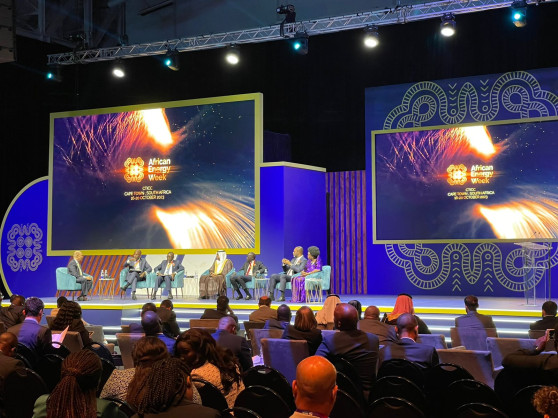Home to over 125 billion barrels of proven crude oil reserves and 620 trillion cubic feet of gas, Africa’s resource wealth stands at the intersection of global energy security. Not only a solution to advancing industrialization and electrification across the continent, investing in African energy will stabilize global markets, thereby strengthening a resilience to global challenges.
The opening panel discussion at the African Energy Week (AEW) 2023 conference in Cape Town – organized by the African Energy Chamber – drew attention to the vital role Africa’s energy resources will play in addressing global security concerns. Speakers explored the potential the continent holds in this arena while providing insights and recommendations to fast-tracking development.
Ahead of the panel discussion, Calib Cassim, Interim Group CEO of South Africa’s state-owned Eskom, provided insight into the utility’s efforts to achieve energy security. He stated that, “We look forward to using transition technologies such as gas and renewables. There will be some element of nuclear [in the energy mix] as well. Eskom cannot do this ourselves: we need to work with government and the private sector.”
Recent geopolitical challenges have highlighted the need to diversify global supply chains, and Africa has emerged as the market of choice amid these efforts. The continent not only offers an array of established energy markets with proven plays but a wealth of untapped opportunities, opening lucrative prospects for E&P players and capital providers.
António Saide, Vice Minister of Mineral Resources and Energy, Mozambique, shared that, “We have the solution to the world’s challenges regarding energy security. We have the energy resources, from coal to renewable energy. We have land for agriculture and can produce biofuels. We can deliver as much as is needed for the world.”
While African energy stands to provide the security global markets so desperately require, the continent’s own energy needs take precedence. Over 600 million people are without access to electricity, a figure expected to grow unless adequate investment is made across the entire energy value chain.
According to Dr. Matthew Opoku Prempeh, Minister of Energy, Ghana, “We need energy security, we need industrialization, and the opportunities that African countries have with their oil and gas resources cannot be ignored. We are interested in developing a blend of energy sources to make [Africa] energy self-reliant. For those reasons, Africa cannot afford to stop drilling and utilizing gas.”
Osvaldo Inácio, Executive Board Member, Sonangol echoed these remarks, stating that, “Half of the population addition will be in Africa. We will need to make sure that there is energy security to meet that demand. As we do that, we also need to make sure we are decarbonizing our operations by deploying technology…it requires multiple solutions.”
Speakers highlighted the need to transition to cleaner sources of energy, with partners such as Saudi Arabia playing a key role in facilitating opportunities in this area.
Eng. Fuad Mosa, Deputy Minister of Localization, Local Content and Risk Management, Ministry of Energy, Saudi Arabia, stated that, “We are trying to help, not only Africa, but the youth of the future. Yes, we need the energy transition, but we need to understand that the energy transition will be different from place to place.”
Following a surge in regulatory reforms and policy adjustments, Africa’s investment climate has never been more attractive. The continent has turned into a not-to-be-missed business opportunity and #AEW2023 stands to facilitate a wave of new deals.
Countries such as South Sudan are highly attractive. Puot Kang Chol, Minister of Petroleum, explained further, stating that, “South Sudan has a bankable alternative pipeline and scalable refinery projects. Investing in fossil fuels, particularly in South Sudan, is not a waste. You will not be there supporting us; we will be doing business together.”
Neighboring Uganda has made great strides towards developing an attractive investment environment. According to Ruth Nankabirwa, Minister of Energy and Mineral Development, “You must create an investment-conducive environment to pull the private sector to come and develop. You also have to work on regional cooperation. Uganda is developing the East African Crude Oil Pipeline and the East African Power Pool. This allows us to share resources.”
The panel discussion represented the first of the #AEW2023 conference in Cape Town. #AEW2023 takes place this week in Cape Town under a mandate to make energy poverty history by 2030. Keep following www.aecweek.com for more exciting information and updates about Africa’s premier energy event.
Distributed by APO Group on behalf of African Energy Chamber.
Latest Stories
-
Mobus CEO apologises to Nigerian Police over Abuja land row, distances firm from protest at Nigerian High Commission in Accra
3 hours -
Experts urge institutionalisation of evidence-based health policies in Ghana
3 hours -
Government to convert National Cathedral site into National Cultural Convention Centre
3 hours -
Former Sports Minister Mustapha Ussif loses sister
4 hours -
Ayoum community appeals for fixing of collapsed bridge to ease commuting
4 hours -
Full text: Mahama’s speech at the Post-Election Evaluation Dialogue
4 hours -
Kumasi: 545 police personnel pass out to support 24-hour economy
4 hours -
No Ghanaian child will be denied tertiary education because of fees – Mahama
4 hours -
Ghana, U.S. reaffirm strategic ties at 249th Independence Day celebration
4 hours -
Full text: Mahama’s speech at launch of No Fees Stress policy
5 hours -
President Mahama promises justice for electoral violence victims
5 hours -
JoyNews Impact Maker awardee nominated for Global Citizen Waislitz Award, vote for him to win $100,000
6 hours -
Partey has fully cooperated with police throughout three-year investigation – Lawyer Jenny Wiltshire
7 hours -
Thomas Partey denies all the charges against him – Partey’s lawyer Jenny Wiltshire
8 hours -
Labena unveils new album “Life in Roses” at Bayview Village
8 hours

